Scottish Cancer Patient Experience Survey 2024: national report
The report shows the results of the Scottish Cancer Patient Experience Survey 2024.
Positive Comment Analysis
Analysis of the positive comments found 5 key themes to be consistent across patient responses:
- Supportive Care (36%, 2,807 codes).
- Positive Staff Interactions (19%, 1,467 codes).
- Appreciative for a Positive Experience (18%, 1,419 codes).
- Efficiency of Processes (16%, 1,248 codes).
- Knowledge Sharing and Information (10%, 758 codes).
Within each of the 5 positive themes, there are also sub-themes which allow patient responses to be grouped into a more detailed sub-category within the overarching theme.
| Themes and Sub-themes | Code Count |
|---|---|
| Theme 1: Supportive Care | 2,807 |
| 1.1 Care Needs | 700 |
| 1.2 Hospital Care Experience | 678 |
| 1.3 Warmth from Staff | 488 |
| 1.4 Support Needs | 476 |
| 1.5 Person Centred Experience | 465 |
| Theme 2: Positive Staff Interaction | 1,467 |
| 2.1 Staff Excellence | 711 |
| 2.2 Highlighted Staff Groups | 443 |
| 2.3 Integrity and Commitment | 313 |
| Theme 3: Appreciative for a Positive Process | 1,419 |
| 3.1 Optimised Process | 642 |
| 3.2 Emotional Response | 567 |
| 3.3 NHS Provision | 210 |
| Theme 4: Efficiency of Processes | 1,248 |
| 4.1 Pro-active Action | 798 |
| 4.2 Organisation of Care | 368 |
| 4.3 Organisation of Staff | 82 |
| Theme 5: Knowledge Sharing and Interaction | 758 |
| 5.1 Patient Outcomes | 273 |
| 5.2 Information Sharing | 240 |
| 5.3 Staff Engagement | 174 |
| 5.4 Method of Communication | 71 |
A breakdown of the sub-themes contained within each key theme can be seen in Figure 8.
Supportive Care was the largest theme identified within the analysis of positive comments.
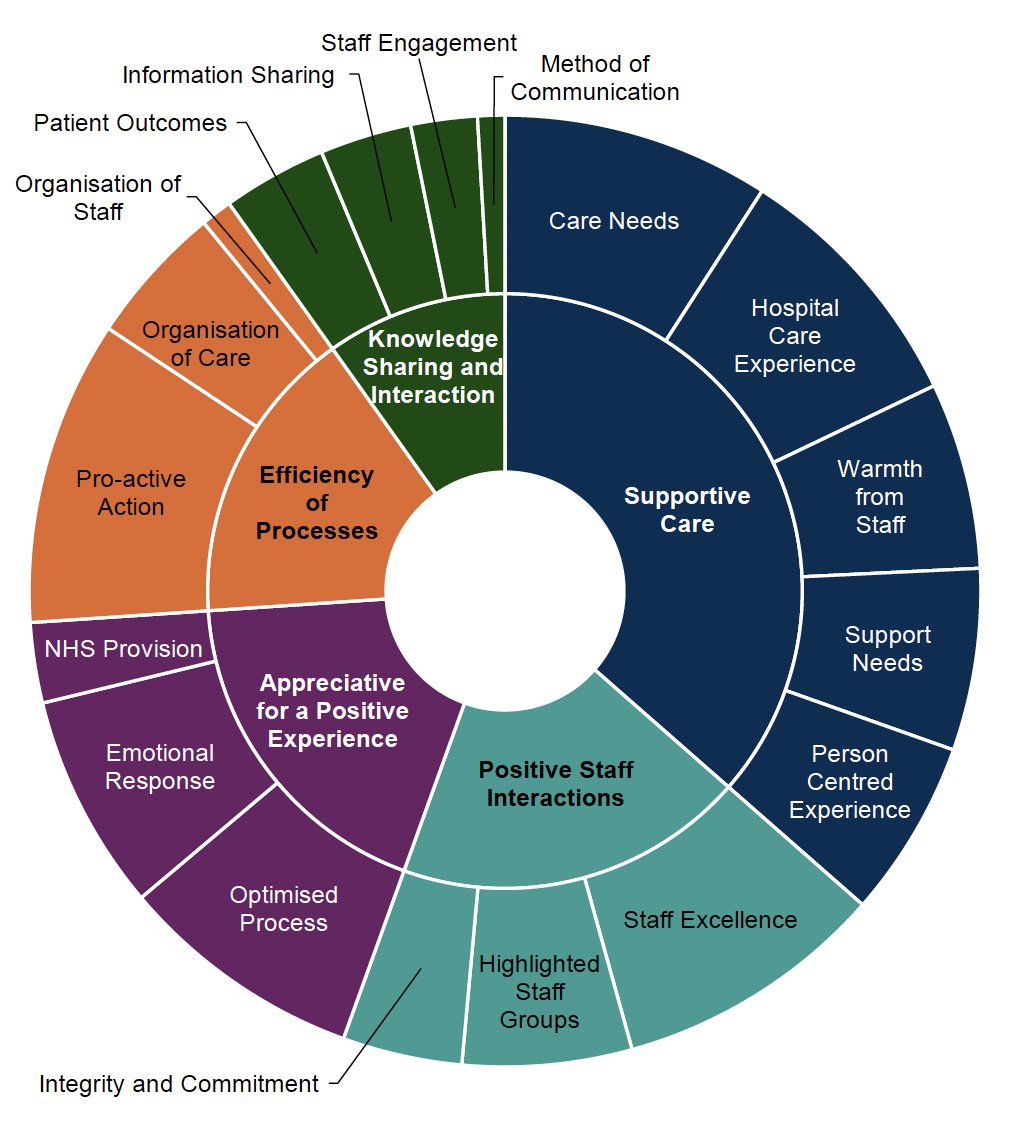
The themes and their subthemes will be discussed in turn, beginning with the largest theme from the positive responses.
Supportive Care
“My experience of cancer care on the NHS was very good from diagnosis to [redacted] operation.”
“I cannot fault the care provided by staff from the various hospitals I attended…”
“Everyone I dealt with was so caring and friendly at what was a scary time for me.”
“I had excellent care the staff were very helpful, I didn't need to worry about anything they put my mind to ease.”
“I have felt fully included and supported at all stages of treatment, which remains ongoing.”
Within the theme of Supportive Care, 5 sub-themes were identified: care needs, hospital care experience, warmth from staff, support needs and person-centred experience.
25% of comments within Supportive Care remarked positively about their care needs being met.
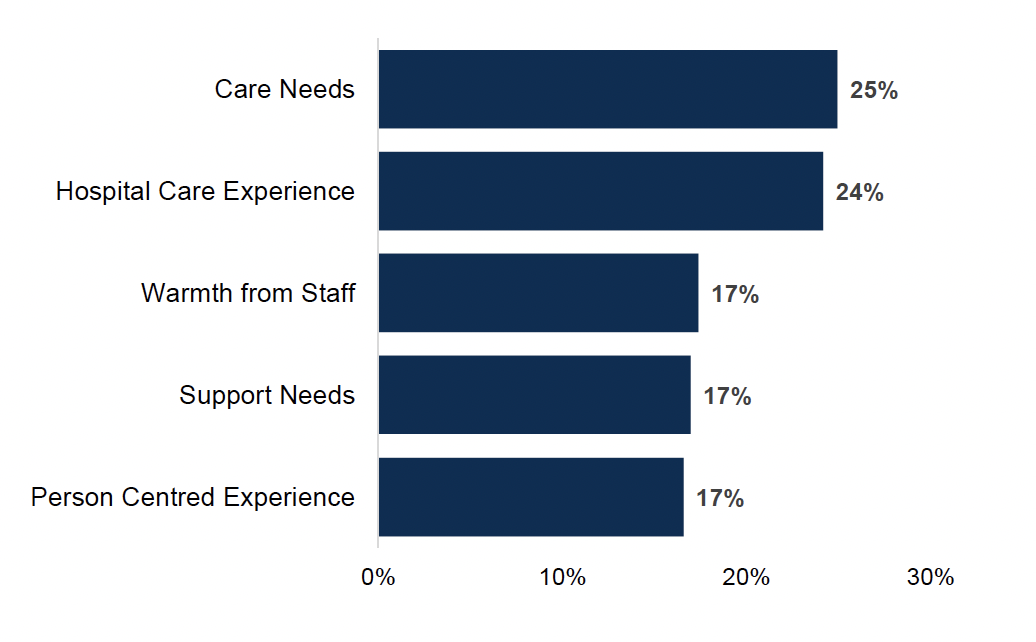
The sub-themes within the theme of Supportive Care were relatively equal in their presentation, with slightly more patients mentioning that their care needs were met (25%) and that they had a positive hospital care experience (24%). The remaining 3 sub-themes note the warmth patients felt from staff in regard to their care (17%), they felt supported throughout the process (17%) and that they felt it was a person-centred experience (17%). The percentages in Figure 9 refer to the proportion of references positively mentioned by patients of each sub-theme category.
Positive Staff Interactions
“Almost everyone that I dealt with was lovely - friendly, helpful and professional.”
“Care and communication by nurses.”
“From start to finish I dealt with dedicated health care professionals at every level from consultants to ward auxiliaries.”
Within the theme of Positive Staff Interactions, 3 sub-themes were identified: staff excellence, highlighted staff groups and, integrity and commitment.
48% of comments within Positive Staff Interactions remarked that the staff were excellent during their care.
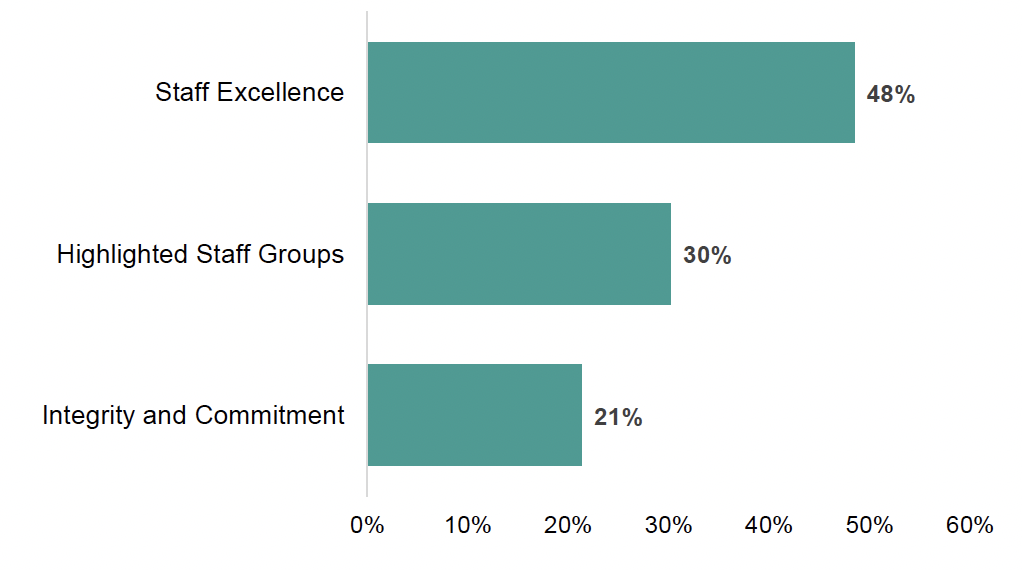
Most responses within this theme were remarking on staff excellence (48%) referring to a general excellent experience with multiple, many or all staff involved in the patient’s care. Around a third of responses gave a special mention to a particular member of staff or team and the role they played in the cancer journey (30%). The remaining sub-theme included comments that referred to the dedication and commitment of the staff involved with their care (21%). The percentages in Figure 10 refer to the proportion of references positively mentioned by patients of each sub-theme category.
Appreciative of a Positive Process
“Nothing could have been better, very satisfied with all aspects of my care.”
“…They put me at ease and it all went smoothly, I am so grateful for their care.”
“I have huge respect for the NHS, it has served me and my family incredibly well. I will always support and be grateful my life has been saved twice by this institution.”
Within the theme of Appreciative for a Positive Process, 3 sub-themes were identified: optimised process, emotional response, and NHS provision.
45% of comments within Appreciative for a Positive Process felt their journey through the cancer care system was optimal.
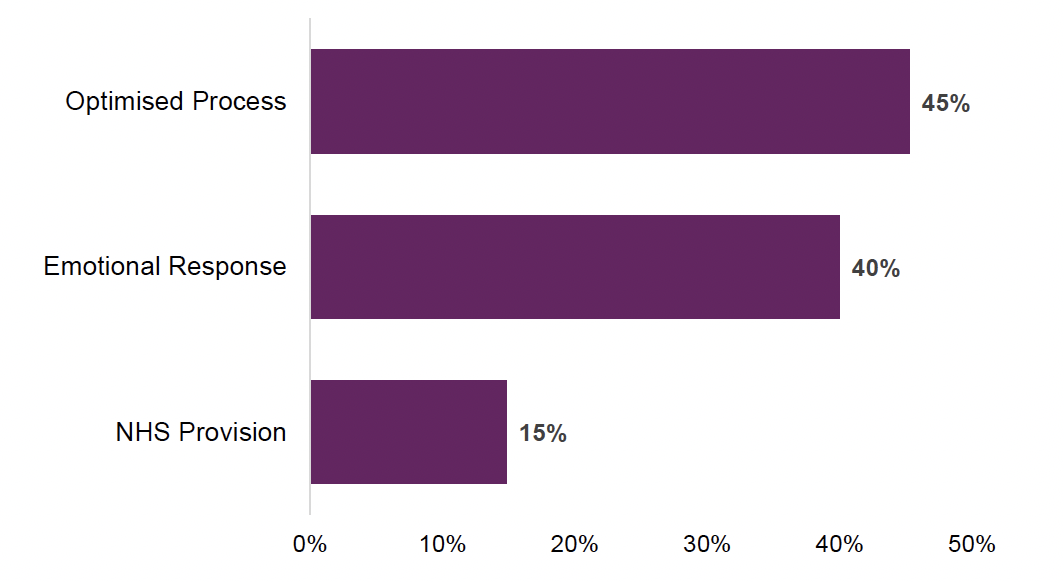
The sub-theme of optimised process was referenced most within this theme (45%), with patients stating that their experience was a positive experience all-round and there was nothing that could have been improved. Further, many patients also remarked on how grateful they were for the care and attention they received, with some also commented on how impressed they were at the service in general (40%). Others made reference to the NHS within their comment, remarking on the cancer screening programs, the excellence of the NHS and the treatment facilities available to them (15%). The percentages in Figure 11 refer to the proportion of references positively mentioned by patients of each sub-theme category.
Efficiency of Processes
“I was extremely impressed with the speed at which everything was done. There was very little waiting and/or worrying. I feel very fortunate to have had the level of care I’ve had...”
“The whole experience was well managed and matched the programme set out in advance.”
“The continuity (staff) who were dealing with me so I didn’t have to explain everything to a new person/team...”
Within the theme of Efficiency of Processes, 3 sub-themes were identified: pro-active action, organisation of care and organisation of staff.
64% of patient comments in Efficiency of Processes described their care as pro-active and responsive.
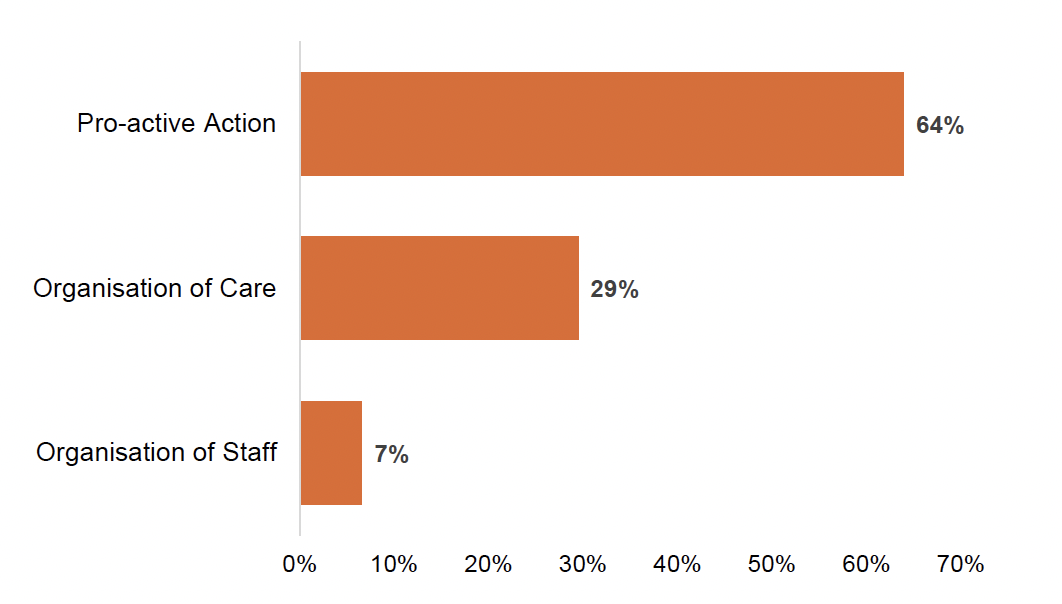
Most comments within this theme mentioned pro-activeness within their experience, either in general or after the initial diagnosis. Also, patients referred to responsive and attentive staff (64%). 29% of comments stated their care was well-organised, this included comments about the organisation of treatment, appointments and / or hospital visits in general. The remaining 7% of comments mentioned they felt as though they had a point of contact and there was also continuity in the staff involved in their care. The percentages in Figure 12 refer to the proportion of references positively mentioned by patients of each sub-theme category.
Knowledge Sharing and Interaction
“I was always well informed about what was going to happen, and when it was going to happen…”
“Open and honest discussion regarding the diagnosis and treatments and an explanation of other options available…”
“…My surgeon was also excellent at keeping me informed - either face to face, on the telephone and also by letter...”
“…After meeting with the surgeon I had a follow up appointment to go through the surgery and ask any further questions I may have with the specialist nurses. I really appreciated this face to face appointment and the ability to phone in with further questions if required.”
Within the theme of Knowledge Sharing and Interaction, 4 sub-themes were identified: patient outcomes, information sharing, staff engagement and method of communication.
36% of patient comments within Knowledge Sharing and Interaction remarked on a positive outcome experienced, due to communication and information needs being met.
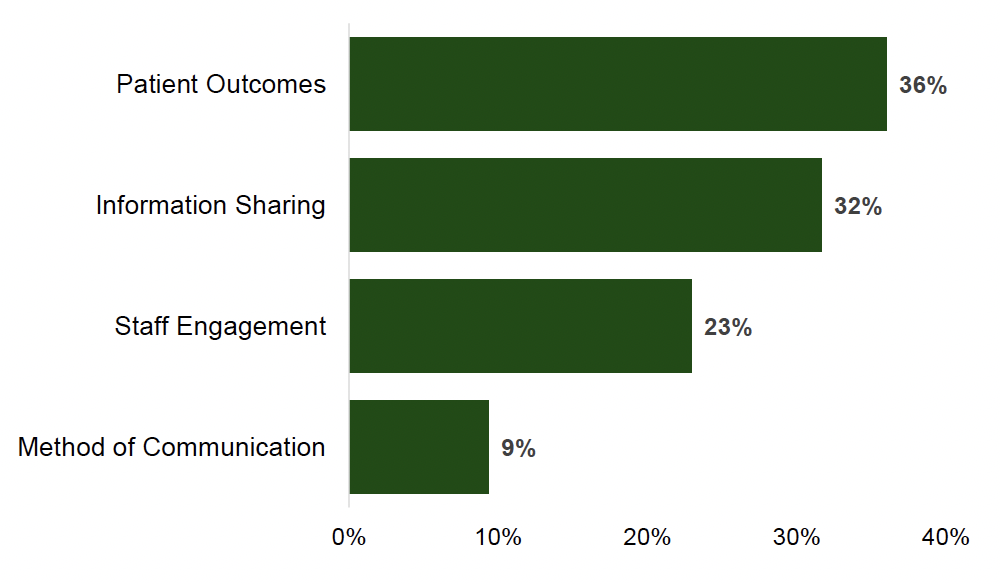
Many patients commented on the opportunities they had regarding communication and information which led to positive outcomes such as, having the information tailored to their own needs and abilities, having time to ask and have their questions answered by healthcare professionals being kept informed throughout the process (36%). Many also generally commented on the information sharing aspect of their care (32%), that the communication and information in general and in relation to their treatment was good. The sub-theme of staff engagement included references about how informative staff were but also how good the internal communication was between Boards, hospitals, and departments (23%). Some patients also commented that the method of communication (face-to-face or telephone) was suitable and appropriate for their needs and care plan (9%). The percentages in Figure 13 refer to the proportion of references positively mentioned by patients of each sub-theme category.
Contact
Email: patientexperience@gov.scot
There is a problem
Thanks for your feedback